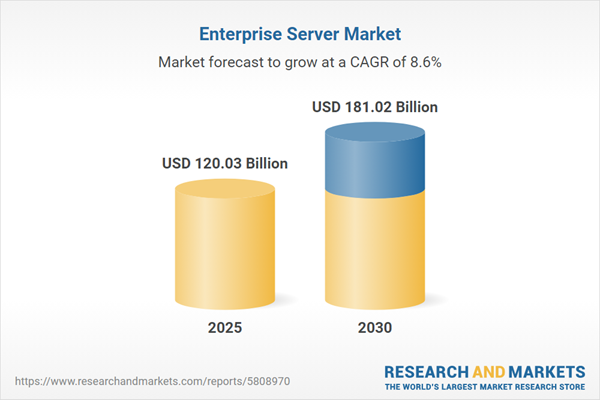The enterprise server market is poised for robust growth from 2025 to 2030, driven by increasing digital transformation, cloud adoption, and the need for high-performance computing across industries. This comprehensive report segments the market by operating system, industry vertical, and geography, providing detailed insights into drivers, challenges, and competitive dynamics through Porter’s Five Forces and industry value chain analyses. It also examines regulatory frameworks and trends shaping the market, equipping stakeholders with critical information to navigate this evolving landscape.
Market Drivers
Digital Transformation and Cloud Adoption
The accelerating pace of digital transformation is a primary driver, as organizations across sectors invest in enterprise servers to support cloud-based applications, big data analytics, and AI-driven workloads. The shift to hybrid and multi-cloud environments demands scalable, secure server infrastructure, boosting market growth. Industries like IT and telecom, BFSI, and healthcare are particularly reliant on servers to ensure operational efficiency and data integrity in increasingly digital ecosystems.Demand for High-Performance Computing
The rise of data-intensive applications, such as machine learning, IoT, and real-time analytics, is fueling demand for high-performance enterprise servers. These servers enable organizations to process large datasets efficiently, supporting innovation and competitiveness. Sectors like manufacturing and media and entertainment are adopting advanced server solutions to handle complex workflows and deliver seamless digital experiences.Market Challenges
The market faces challenges related to high initial investment costs and the complexity of integrating modern server infrastructure with legacy systems. Additionally, evolving cybersecurity threats necessitate robust server security measures, increasing operational demands for enterprises. Regulatory compliance across regions further complicates server deployment, requiring tailored solutions to meet diverse standards.Market Segmentation
By Operating System
The market is segmented into UNIX, Linux, Windows, and others. Linux is gaining prominence due to its open-source nature, cost-effectiveness, and compatibility with cloud environments, making it a preferred choice for enterprises. Windows servers remain dominant in industries like BFSI and retail, where compatibility with Microsoft ecosystems is critical. UNIX and other systems cater to niche applications requiring high reliability.By Industry Vertical
Key verticals include BFSI, retail, media and entertainment, IT and telecom, healthcare, manufacturing, and others. BFSI leads due to its need for secure, high-speed transaction processing, while IT and telecom drive demand through cloud and network infrastructure expansion. Healthcare is adopting servers to manage electronic health records and support telemedicine, while manufacturing leverages servers for automation and supply chain optimization.Geographical Outlook
North America: Market Leader
North America, particularly the U.S., dominates the enterprise server market due to its advanced IT infrastructure, high cloud adoption, and significant investments in AI and analytics. The region’s robust regulatory environment and presence of major server vendors further solidify its leadership.Asia Pacific: Rapid Growth
Asia Pacific is expected to witness the fastest growth, driven by rapid digitalization in countries like China, India, and Japan. Government initiatives promoting smart cities and Industry 4.0, coupled with expanding IT and telecom sectors, are boosting server demand. The region’s growing SME sector is also adopting cloud-based servers to enhance competitiveness.Competitive Landscape
The report maps key players on a vendor matrix across four quadrants: leader, follower, challenger, and niche. Leading companies are investing in R&D to develop energy-efficient, scalable servers while addressing cybersecurity concerns. Strategic partnerships and acquisitions are common to expand market reach and enhance technological capabilities.Key Benefits of this Report:
- Insightful Analysis: Gain detailed market insights covering major as well as emerging geographical regions, focusing on customer segments, government policies and socio-economic factors, consumer preferences, industry verticals, and other sub-segments.
- Competitive Landscape: Understand the strategic maneuvers employed by key players globally to understand possible market penetration with the correct strategy.
- Market Drivers & Future Trends: Explore the dynamic factors and pivotal market trends and how they will shape future market developments.
- Actionable Recommendations: Utilize the insights to exercise strategic decisions to uncover new business streams and revenues in a dynamic environment.
- Caters to a Wide Audience: Beneficial and cost-effective for startups, research institutions, consultants, SMEs, and large enterprises.
What do businesses use our reports for?
Industry and Market Insights, Opportunity Assessment, Product Demand Forecasting, Market Entry Strategy, Geographical Expansion, Capital Investment Decisions, Regulatory Framework & Implications, New Product Development, Competitive IntelligenceReport Coverage:
- Historical data from 2022 to 2024 & forecast data from 2025 to 2030
- Growth Opportunities, Challenges, Supply Chain Outlook, Regulatory Framework, and Trend Analysis
- Competitive Positioning, Strategies, and Market Share Analysis
- Revenue Growth and Forecast Assessment of segments and regions including countries
- Company Profiling (Strategies, Products, Financial Information, and Key Developments among others).
The enterprise server market is analyzed into the following segments:
By Server Type
- UNIX
- Blade
- Multi-Node
- Tower
- Rack Optimized
By Operating System
- UNIX
- Linux
- Windows
- Others
By Industry Vertical
- BFSI
- Retail
- Media and Entertainment
- IT and Telecom
- Healthcare
- Manufacturing
By Geography
- North America
- United States
- Canada
- Mexico
- South America
- Brazil
- Argentina
- Others
- Europe
- United Kingdom
- Germany
- France
- Spain
- Others
- Middle East and Africa
- Saudi Arabia
- UAE
- Israel
- Others
- Asia Pacific
- Japan
- China
- India
- South Korea
- Indonesia
- Thailand
- Others
Table of Contents
Companies Mentioned
- Dell
- Apple, Inc.
- Hewlett Packard Enterprise
- NEC Corporation
- Toshiba Corporation
- Fujitsu Computer Systems Corporation
- Aspera, Inc.
- Acer, Inc.
Table Information
| Report Attribute | Details |
|---|---|
| No. of Pages | 148 |
| Published | July 2025 |
| Forecast Period | 2025 - 2030 |
| Estimated Market Value ( USD | $ 120.03 Billion |
| Forecasted Market Value ( USD | $ 181.02 Billion |
| Compound Annual Growth Rate | 8.5% |
| Regions Covered | Global |
| No. of Companies Mentioned | 8 |









